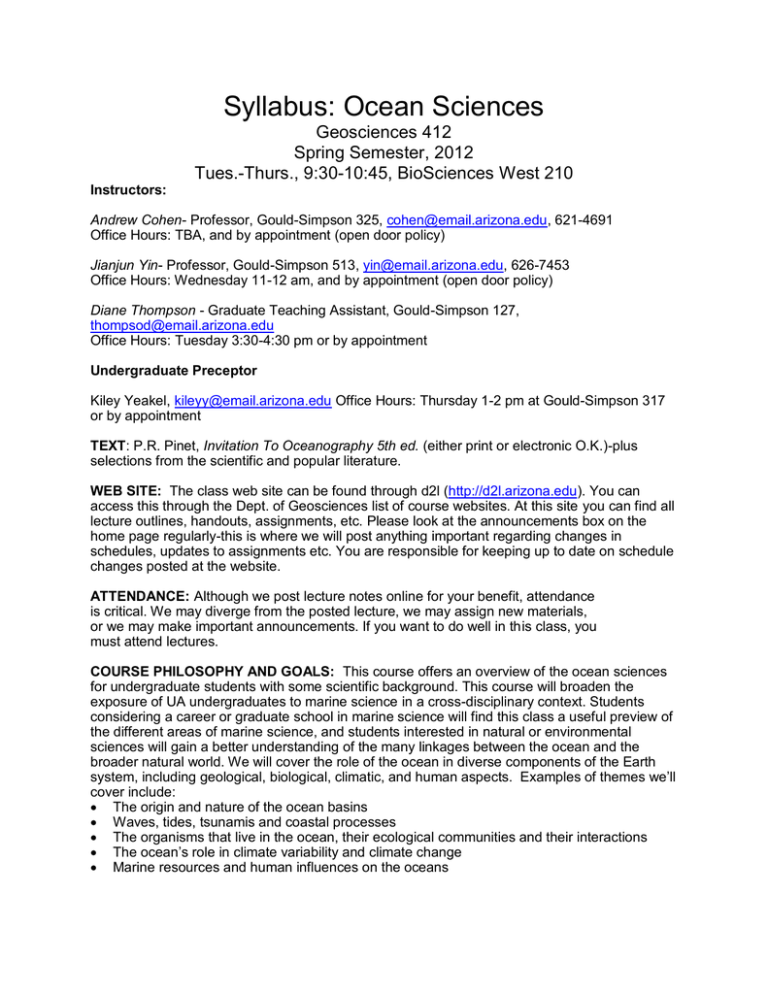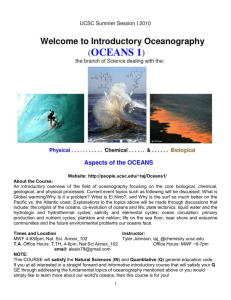Syllabus: Ocean Sciences Geosciences 412 Spring Semester, 2012 Tues.-Thurs., 9:30-10:45, BioSciences West 210
advertisement

Syllabus: Ocean Sciences Geosciences 412 Spring Semester, 2012 Tues.-Thurs., 9:30-10:45, BioSciences West 210 Instructors: Andrew Cohen- Professor, Gould-Simpson 325, cohen@email.arizona.edu, 621-4691 Office Hours: TBA, and by appointment (open door policy) Jianjun Yin- Professor, Gould-Simpson 513, yin@email.arizona.edu, 626-7453 Office Hours: Wednesday 11-12 am, and by appointment (open door policy) Diane Thompson - Graduate Teaching Assistant, Gould-Simpson 127, thompsod@email.arizona.edu Office Hours: Tuesday 3:30-4:30 pm or by appointment Undergraduate Preceptor Kiley Yeakel, kileyy@email.arizona.edu Office Hours: Thursday 1-2 pm at Gould-Simpson 317 or by appointment TEXT: P.R. Pinet, Invitation To Oceanography 5th ed. (either print or electronic O.K.)-plus selections from the scientific and popular literature. WEB SITE: The class web site can be found through d2l (http://d2l.arizona.edu). You can access this through the Dept. of Geosciences list of course websites. At this site you can find all lecture outlines, handouts, assignments, etc. Please look at the announcements box on the home page regularly-this is where we will post anything important regarding changes in schedules, updates to assignments etc. You are responsible for keeping up to date on schedule changes posted at the website. ATTENDANCE: Although we post lecture notes online for your benefit, attendance is critical. We may diverge from the posted lecture, we may assign new materials, or we may make important announcements. If you want to do well in this class, you must attend lectures. COURSE PHILOSOPHY AND GOALS: This course offers an overview of the ocean sciences for undergraduate students with some scientific background. This course will broaden the exposure of UA undergraduates to marine science in a cross-disciplinary context. Students considering a career or graduate school in marine science will find this class a useful preview of the different areas of marine science, and students interested in natural or environmental sciences will gain a better understanding of the many linkages between the ocean and the broader natural world. We will cover the role of the ocean in diverse components of the Earth system, including geological, biological, climatic, and human aspects. Examples of themes we’ll cover include: The origin and nature of the ocean basins Waves, tides, tsunamis and coastal processes The organisms that live in the ocean, their ecological communities and their interactions The ocean’s role in climate variability and climate change Marine resources and human influences on the oceans The prerequisite for this class is at least one year of a natural science class for majors (not NATS). Assignments will include quantitative problem sets and web-based data analyses. GRADING: We base final grades strictly on a points system. The final grade depends on your performance on three hourly exams (15% each), on your completion of homework assignments given throughout the semester (45%, 5% each) and on an in-class presentation you will give toward the end of the semester (10%). Final letter grades will be given on a percentage basis, according to a standard curve: 90-100% = A 80- 89% = B 70- 79% = C 60- 69% = D <60% =E LATE HOMEWORK POLICY. Homework due dates are given on the class schedule by 5PM. Please turn in homework to Diane, either directly or in her mailbox (Gould Simpson 218). Late homework will be marked off 10% (i.e 0.5% of your final grade) per class day, not including weekends and holidays. EXTRA CREDIT: We will provide you the opportunity to earn 3% of your grade through extra credit. If you attend an on-campus talk in the natural sciences and write a 250-word abstract of this talk, you can earn up to 1%, and you can repeat this exercise three times to earn up to 3%. Abstracts must be turned in within one week of the presentation you attended. The talks must be approved in advance (a list of approved talks will be posted on the d2l website). CLASS FORMAT: Each week, we will give two 75-minute lectures. Some weeks the “lecture” may actually be a discussion or demonstration. The last 4 lecture periods will be given over to student presentations (see below) To do well in class you must attend lecture and take notes. The homework substitutes for a lab, for which you are receiving credit but which we could not schedule originally because of uncertainty as to whether this course would be assigned a TA. Diane (your TA) will hold scheduled times when she will be available to answer questions. We will distribute a questionnaire the first day of class to determine the times that she will be available. For a small number of homework assignments we will also schedule times when you can access equipment or supplies that may be needed to complete the assignment. During the field trip we will collect data used in subsequent exercises (details to follow). FIELD TRIP: A field trip to southern California is scheduled for April 6-8 (Friday to Sunday). We will leave early (7 AM) on the 6th and return late (~9 PM) on the 8th. The trip will be campingbased and include a half-day demonstration cruise on a small oceanographic vessel. A grade will be assigned for your work on the trip and in the follow-up exercise (this is wrapped up in the “homework” part of your grade). Most students consider the field trip to be the highlight of this course. The trip is mandatory to pass the class. If you cannot attend because of a prior commitment or last minute emergency we will provide an optional (but less than fun) makeup assignment. However we strongly discourage this option. Please let us know the first day of class if you will be unable to attend the trip. STUDENT PRESENTATIONS On the last 4 days of classes, each of you will be required to give a presentation on a subject of your choice related to regional (i.e. Gulf of California or eastern Pacific/western US) oceanographic, resource or environmental issues. We ask you to pair up and share a 15 minute time slot. The presentation must be based on at least 3 refereed journal articles (preferably more), in which you synthesize original research work that has been done on your chosen topic. You should prepare your talk using either Powerpoint or overhead illustrations and distribute a handout (with bibliography) to the class. Presentations grades (worth 10% of your final grade) will be based on technical content, organization, and clarity. Please see one of the professors before the end of March to discuss a topic. LEARNING AND TESTING DISABILITIES: If you have a disability that requires specific accommodations, please present inform us through the Disability Resources Center, and we will work with you to provide the accommodations that you need. ACADEMIC DISHONESTY: The guiding principle of academic integrity is that your submitted work must be your own. We expect you to be familiar with the UA Code of Academic Integrity (http://w3.arizona.edu/~studpubs/policies/cacaint.htm) and expect that you agree to abide by it. If you do not agree with the definitions, principles, policies and procedures set out in this code, you must drop this course. Conduct prohibited by the Code consists of all forms of academic dishonesty, including, but not limited to: cheating, fabrication, facilitating academic dishonesty, and plagiarism as set out and defined in the Code of Conduct, ABOR Policy 5-308-E.10 and F.1; submitting an item of academic work that has previously been submitted without fair citation of the original work or authorization by the faculty member supervising the work; modifying work to obtain additional credit in the same class unless approved in advance by the faculty member; failure to observe rules of academic integrity established by a faculty member for a particular course. For homework assignments, it is allowable to work with another classmate to understand the problems but the written answers should be in your own words (i.e. not copied between students). Any attempt to commit an act prohibited by these rules shall be subject to sanctions to the same extent as completed acts. If you cheat in our class, we will impose some or all of the following sanctions: loss of up to twice the credit for the work involved, reduction in grade, or a failing grade in the course. We may also recommend suspension or expulsion to a University Hearing Board, which may impose other sanctions. Group study is permitted, but all materials submitted for credit must reflect your own independent work. Collaboration on assignments is permitted, but answers must be in your own words and reflect your own independent efforts! Homework sets that are identical or nearly identical will be treated as evidence for academic dishonesty on the part of all students involved. The guiding principle of academic integrity is that your submitted work must be your own.




